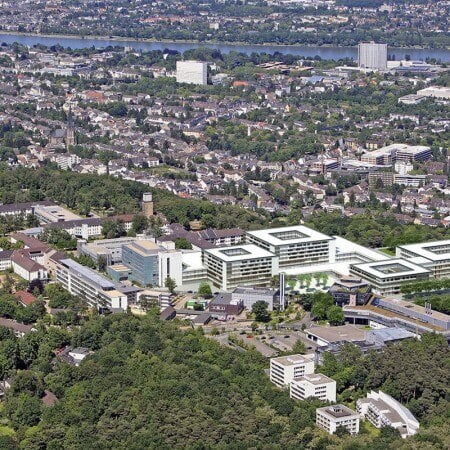The small intestine includes the duodenum, jejunum, and ileum. The tumors of these organs are rare: they account for about 2% of all gastrointestinal neoplasms. More than half of the cases are the cancer of the duodenum, which is located just behind the stomach. The most common tumors are adenocarcinoma and carcinoid. Less common are lymphomas and sarcomas. Most neoplasms are treated with surgery. Radiation therapy and chemotherapy may be required after tumor removal.
Content
- Surgical treatment of small intestine cancer
- Chemotherapy and radiation therapy
- Treatment of neuroendocrine tumors
The cost of procedures and surgical interventions depends on where you undergo treatment, who performs your treatment, and what methods are used. We will help you select the clinic with the best ratio of prices and quality of medical services.
It is better to contact the clinics whose doctors specialize in the treatment of small intestine cancer and achieve significant progress: the University Hospital of the Ludwig Maximilian University of Munich, the University Hospital Duesseldorf, the University Hospital Ulm.
Leave a request with medical information on the Booking Health website. We will recommend a specialized hospital and doctor, take care of your flight and accommodation, and provide you with an interpreter. A personal coordinator will always be in touch with you and will help you feel confident in Germany.
Surgical treatment of small intestine cancer
The treatment of small intestine cancer mainly involves the use of two types of surgical interventions:
Segmental resection. The doctor dissects the small intestine a few centimeters above and below the tumor. He then sutures the ends together to restore the integrity of the gastrointestinal tract. The adjacent lymph nodes are also removed. If the neoplasm is localized in the ileum, it may be necessary to remove the adjacent section of the large intestine.
The operation is usually performed through an abdominal incision. The specialized centers in Germany also perform laparoscopic interventions. They are performed through short incisions, with thin long instruments, under the guidance of a mini video camera. After such surgical interventions, patients recover faster and suffer with less complications. Blood loss and hospitalization periods are reduced.
Pancreaticoduodenal resection. This is a standard surgical intervention for duodenal cancer. The tumor is located near the pancreas, so the head of this organ is removed along with the section of the small intestine. In addition, the doctor removes the gallbladder, part of the bile duct, stomach, and sometimes other tissue involved in the tumor process. These manipulations are followed by a reconstructive stage: the restoration of the continuity of the digestive tract, connection of the bile and pancreatic ducts to the remaining part of the small intestine. This is a complex and lengthy operation, which is best performed in a specialized center with extensive experience. Even such a complex surgical intervention is performed laparoscopically in some clinics.
Chemotherapy and radiation therapy
Small bowel cancer is minimally responsive to chemotherapy. Therefore, it is rarely used, mainly in the advanced stages, if there are distant metastases. Some clinics use chemotherapy as an adjuvant treatment, but it is not yet known whether it affects the patient's survival rate.
Doctors in Germany also use local chemotherapy, which is known as hyperthermic intraperitoneal chemotherapy. It is performed immediately after tumor removal surgery. Doctors rinse the abdomen with a warm solution of chemotherapy drugs to destroy any remaining tumor cells.
Radiation therapy can sometimes be used after surgery to reduce the risk of recurrence. It is not yet known whether it affects the survival of patients. Irradiation is usually used only with metastases detected in distant lymph nodes. Radiation is directed to the site of the lymphatic collector of the tumor.
Treatment of neuroendocrine tumors
Carcinoids (neuroendocrine tumors) account for one-third of all malignant tumors of the small intestine. These are tumors of hormone-producing cells. The disease has no symptoms for a long time, so it is often detected only after the development of metastases. They usually affect the liver.
Treatment options:
- laparoscopic surgical resection of the tumor, if it has not yet metastasized;
- cytoreductive surgery with the removal of all tumor foci – with the tumor spreading to the abdominal cavity.
In the advanced stages of cancer, radiation therapy, drug therapy, as well as palliative procedures and surgeries are used, namely endoscopic bougienage and stenting for small intestine cancer with stenosis, and bile unloading operations.
To undergo small intestine cancer diagnostics and small intestine cancer treatment in Germany, you are welcome to use the Booking Health service. On our website, you can find the prices for medical services in various cancer clinics in Germany and book a medical care program at a favorable price. The Booking Health specialists will help you select a clinic and arrange your trip.
Authors:
The article was edited by medical experts, board certified doctors Dr. Nadezhda Ivanisova and Dr. Vadim Zhiliuk. For the treatment of the conditions referred to in the article, you must consult a doctor; the information in the article is not intended for self-medication!
Our editorial policy, which details our commitment to accuracy and transparency, is available here. Click this link to review our policies.
Sources:
National Cancer Institute
American Cancer Society
Mayo Clinic


















